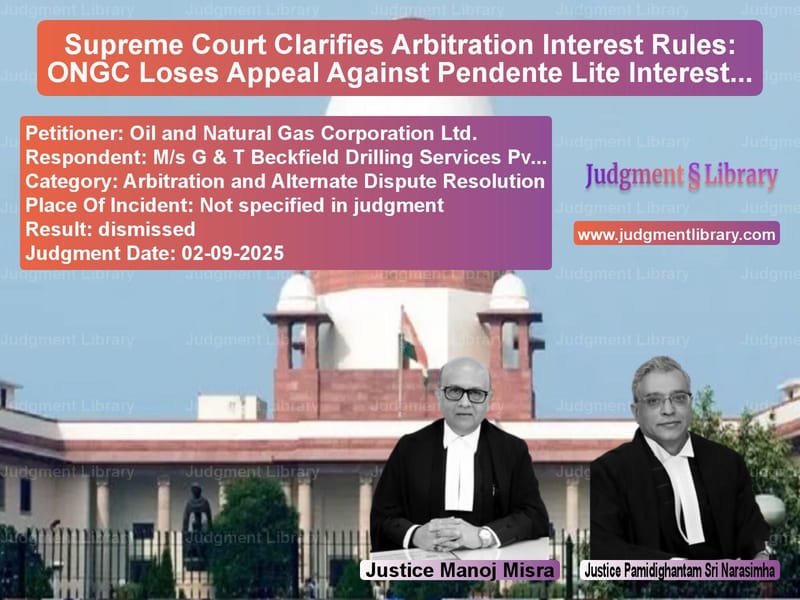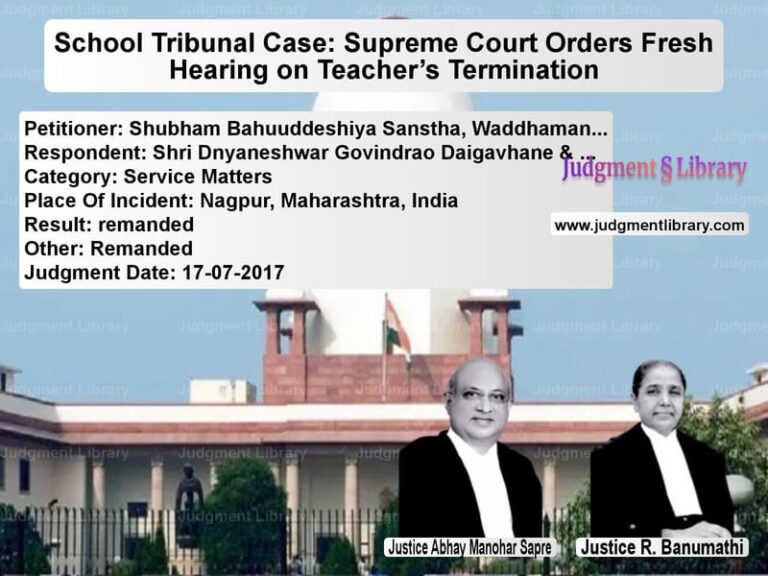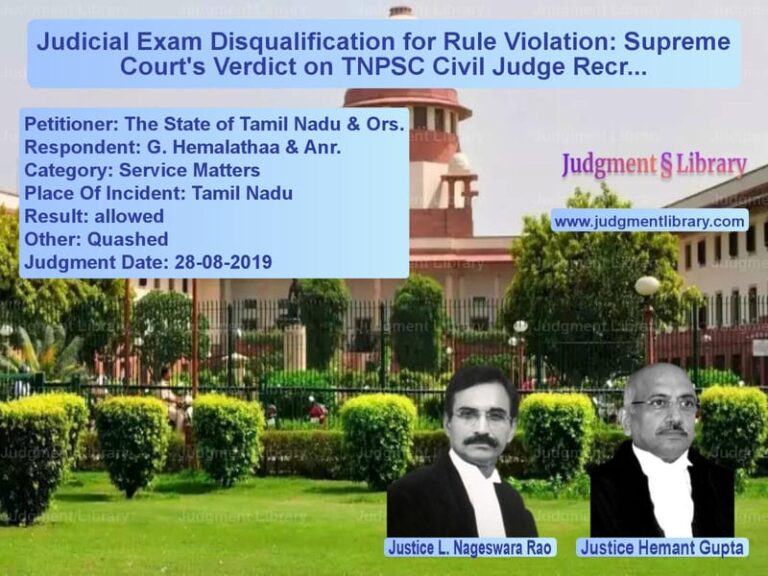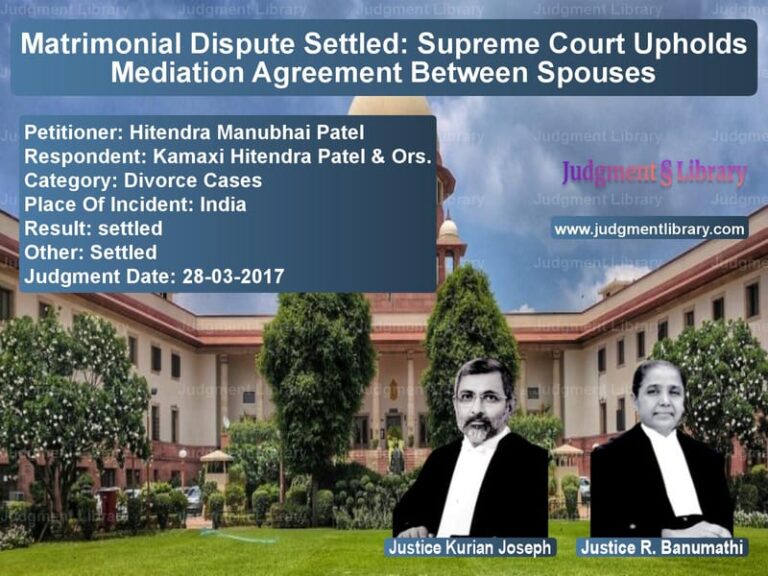Supreme Court Clarifies Arbitration Interest Rules: ONGC Loses Appeal Against Pendente Lite Interest Award
In a significant ruling that clarifies the power of arbitral tribunals to award interest during pending proceedings, the Supreme Court of India has dismissed an appeal by the Oil and Natural Gas Corporation Limited (ONGC) challenging an arbitral award that granted pendente lite interest to M/s G & T Beckfield Drilling Services Pvt. Ltd. The judgment, delivered by a bench comprising Justice Manoj Misra and Justice Pamidighantam Sri Narasimha, provides crucial guidance on when contractual clauses can restrict arbitrators from awarding interest during the arbitration process.
The dispute between ONGC and the drilling services company dates back to 2004 when a three-member arbitral tribunal awarded M/s G & T Beckfield approximately $656,272.34 along with interest at 12% per annum from December 12, 1998, until recovery of the amount. The tribunal also awarded costs of ₹5 lakhs to the drilling company while dismissing ONGC’s counter-claims. The core of ONGC’s challenge centered around Clause 18.1 of their agreement, which stated: “No interest shall be payable by ONGC on any delayed payment / disputed claim.”
The legal journey of this case saw multiple twists and turns. Initially, the District Judge in Sivasagar set aside the arbitral award in 2007, but the Gauhati High Court reversed this decision in 2019 and restored the award. When ONGC approached the Supreme Court, the scope of the appeal was specifically limited to whether interest on the total awarded amount at 12% could be awarded given the contractual restrictions.
During the proceedings, the learned counsel for the appellant ONGC relied heavily on Clause 18.1 of the agreement and submitted that “Section 31(7) of 1996 Act, clearly provides that power of arbitral tribunal to award interest for the period between the date the cause of action arose up to the date of the award is subject to the agreement between the parties, therefore, in view of clause 18.1 no interest could have been awarded. Hence, the arbitral award is liable to be set aside to the extent it awards interest on the amount awarded from the date of the claim up to the date of the award.”
On the other side, the learned counsel for the respondent drilling company presented a different interpretation, arguing that “clause 18.1, if read as a whole, would indicate that payment is not to be withheld if the amount is not in dispute. It is only when there is a dispute, interest is not payable on delayed payment. However, here, the arbitral tribunal has not awarded interest on pre-reference period. It awarded interest not from the date the cause of action arose, but from the date the claim was affirmed before the arbitral tribunal. In such circumstances, once it was found that balance amount on the invoices was unjustifiably withheld, payment of interest is lawful.”
The Supreme Court’s analysis delved deep into the legal framework governing arbitration interest awards. The Court explained that Section 31(7) of the Arbitration and Conciliation Act, 1996, deals with interest awards and has two distinct parts. Clause (a) covers interest for the period between when the cause of action arises and when the award is made, while clause (b) deals with post-award interest. Importantly, the Court noted that “award of pre-reference and pendente-lite interest is subject to the agreement between the parties whereas post award interest is statutorily governed and is not subject to the agreement between the parties.”
The Court made a crucial distinction in its judgment, stating that “the arbitral tribunal has awarded interest not from the date of the award (i.e., 21.11.2004), but from 12.12.1998 (i.e., the date when the statement of claim was affirmed before the arbitral tribunal). Thus, what is in issue is the award of interest pendente lite on the sum awarded.”
In its comprehensive analysis, the Supreme Court reviewed several landmark judgments on arbitration interest, including Irrigation Deptt., State of Orissa v. G.C. Roy, Union of India v. Ambica Construction, and other relevant cases. The Court distilled the legal principles, observing that “arbitral tribunal can be denuded of its power to award pendente lite interest only if the agreement/contract between the parties is so worded that the award of pendente lite interest is either explicitly or by necessary implication barred.”
The Court provided crucial guidance on interpreting interest-barring clauses, stating that “a clause merely barring award of interest on delayed payment by itself will not be readily inferred as a bar to award pendente-lite interest by the arbitral tribunal.” This distinction became the cornerstone of their decision.
When examining Clause 18.1 specifically, the Court found that “Clause 18.1, which appellant relies upon to canvass that the agreement between the parties proscribes grant of pendente-lite interest, when read as a whole, does not expressly or by necessary implication proscribes grant of pendente lite interest by the arbitral tribunal. The clause merely says that there would be no interest payable by the Corporation on any delayed payment / disputed claim. Neither it bars the arbitral tribunal from awarding pendente lite interest nor it says that interest would not be payable in any respect whatsoever as was the phraseology of the interest proscribing clause in Sayeed Ahmed & Co. and THDC First.”
The Court contrasted this with clauses in other cases where interest was clearly barred, noting that in Sayeed Ahmed & Co., the clause stated that “no claim for interest or damages will be entertained by the Government with respect to any money or balance which may be lying with the Government or any becoming due owing to any dispute, difference or misunderstanding between the Engineer-in-Charge on the one hand and the contractor on the other hand or with respect to any delay on the part of the Engineer-in-Charge in making periodical or final payment or any other respect whatsoever.” The Court found this language to be “comprehensive and bars interest under any head in clear and categorical terms.”
Similarly, in THDC First, the clauses stated that “no claim for interest on damages will be entertained or payable by the Government in respect of any money or balances which may be lying with the Government owing to any disputes, differences or misunderstandings between the parties” and “no omission on the part of the engineer in charge to pay the amount due upon measurement or otherwise shall vitiate or make void the contract, nor shall the contractor be entitled to interest upon any guarantee or payments in arrears nor upon any balance which may on the final settlement of his accounts be due to him.”
The Supreme Court found that Clause 18.1 in the ONGC case lacked the comprehensive language needed to completely bar the arbitral tribunal’s power to award pendente lite interest. The Court concluded that “Clause 18.1 would not limit the statutory power of the arbitral tribunal to award pendente-lite interest. Consequently, we find no such error in the award of pendente lite interest as may warrant interference with the award.”
The Court also noted that the 12% interest rate awarded was “reasonable being lower than the statutorily prescribed rate then prevalent under clause (b) of sub-section (7) of Section 31.”
This judgment provides important clarity for businesses and legal professionals involved in commercial contracts and arbitration proceedings. It establishes that not every clause restricting interest payments will automatically prevent arbitral tribunals from awarding pendente lite interest. The language must be explicit and comprehensive, clearly demonstrating the parties’ intention to remove the arbitrator’s power to award such interest.
The Supreme Court’s decision reinforces the principle that arbitration agreements must be interpreted carefully, and courts should not readily infer restrictions on arbitral powers unless the contractual language explicitly requires such limitations. This approach balances contractual freedom with the need to maintain the effectiveness of arbitration as a dispute resolution mechanism.
For companies like ONGC and contractors working with public sector enterprises, this judgment serves as a reminder to carefully draft contractual clauses related to interest payments if they intend to completely restrict arbitrators’ power to award interest during arbitration proceedings. Vague or general restrictions may not suffice to overturn arbitral awards that include pendente lite interest.
The dismissal of ONGC’s appeal means the original arbitral award from 2004, with the 12% interest from December 1998, stands validated, bringing closure to a legal battle that has spanned over two decades. The ruling also contributes to the evolving jurisprudence on arbitration law in India, particularly regarding the interpretation of contractual restrictions on arbitral powers.
Petitioner Name: Oil and Natural Gas Corporation Ltd..Respondent Name: M/s G & T Beckfield Drilling Services Pvt. Ltd..Judgment By: Justice Manoj Misra, Justice Pamidighantam Sri Narasimha.Place Of Incident: Not specified in judgment.Judgment Date: 02-09-2025.Result: dismissed.
Don’t miss out on the full details! Download the complete judgment in PDF format below and gain valuable insights instantly!
Download Judgment: oil-and-natural-gas-vs-ms-g-&-t-beckfield-supreme-court-of-india-judgment-dated-02-09-2025.pdf
Directly Download Judgment: Directly download this Judgment
See all petitions in Arbitration Awards
See all petitions in Commercial Arbitration
See all petitions in Enforcement of Awards
See all petitions in Contract Disputes
See all petitions in Judgment by Manoj Misra
See all petitions in Judgment by P.S. Narasimha
See all petitions in dismissed
See all petitions in supreme court of India judgments September 2025
See all petitions in 2025 judgments
See all posts in Arbitration and Alternate Dispute Resolution Category
See all allowed petitions in Arbitration and Alternate Dispute Resolution Category
See all Dismissed petitions in Arbitration and Alternate Dispute Resolution Category
See all partially allowed petitions in Arbitration and Alternate Dispute Resolution Category







